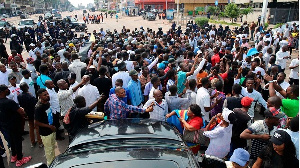Africa News of Monday, 16 October 2023
Source: theeastafrican.co.ke
DR Congo December polls attract 22 opponents for Tshisekedi
On December 20, the Democratic Republic of Congo will be heading to the polls to elect the next president. Twenty-three candidates, among them several youths, two pastors, and one woman, will face off with President Félix Tshisekedi.
Observers broadly classify the candidates into two groups: The serious and those whose chances are next to nil. Even then, the candidates agree on a need to transform DRC and put its resources to better use. What is more, they all accused Rwanda of fomenting rebellions in the DRC.
First off the ramp of the heavyweights — and not necessarily the most likely to win — is ex-minister Delly Sessanga, 53, and member of parliament since 2006, who is presenting himself as one of the most competent candidates.
Hardliners versus doves:
“I have presented a candidacy based on a project that will not only unite the Congolese people, bringing them together to give meaning to and ensure that progress is shared among us. But also, a project that will restore to our nation the foundations of its stability, security, and independence”, declared Sessanga.
Then there is Moïse Katumbi, owner of the football team Tout Puissant Mazembe, who is reputed to be a good manager. He is regarded as one of the most feared challengers in the Tshisekedi camp.
Like Katumbi, Martin Fayulu is also popular, particularly in Kinshasa and several provinces in the west of the country. He has a hard position on the war in North Kivu and Ituri. He lays claim to the political heritage of Étienne Tshisekedi wa Mulumba, the father of the current head of state.
Franck Diongo also claims to be a descendant of Étienne Tshisekedi wa Mulumba, accusing the current president of having strayed from his father’s fight to establish the rule of law.
The candidates must now also reckon with Denis Mukwege, the Nobel Peace laureate, who is engaged in virulent verbal exchanges with Félix Tshisekedi.
“Be vigilant, watch out for foreign candidates”, declared Félix Tshisekedi, insinuating that certain candidates were “puppets”, placed in Congo to serve the interests of other nations.
Mukwege replied that he was “the most Congolese of all the candidates”. “I have always worked in DR Congo. It’s unfortunate that these people who live in Europe, who live on welfare subsidies from Europe, have their father’s address in the Congo, but we don’t know their address in the Congo, can say that I'm a white man's candidate”.
There is also former prime minister Matata Ponyo. He is optimistic despite his legal troubles. He is accused of misappropriating public funds allocated to a major agricultural project during his time as prime minister (2012-2016). His trial is underway.
The only woman:
On to the lightweights but no less important candidates.
Marie-José Ifoku, 58, and the only woman in the race will be hoping her message of ending the exploitation of the country will endear her to the electorate.
Into the cauldron are pastors Théodore Ngoy, 65, and Aggrey Ngalasi, 69. The latter claims to have received a mission from God for the DRC. “We obeyed the voice of God who wants to bless this nation because God loves the DRC.”
Mr. Ngoy, who is also a lawyer and was on the ballot in 2018, is presenting himself as the ideal candidate to save the country.
“To halt the destruction of the country, we need a just man, a good man, capable. I am that man”, he said.
From the youth, comes Constant Mutamba, 35, a lawyer who likes to compare his commitment to that of Patrice Lumumba, Che Guevara, and Mahatma Gandhi. He presents himself as the candidate of the “rupture” and holds very strong anti-Rwanda sentiments.
Mutamba’s position is similar to that of former prime minister Adolphe Muzito, 66. His political offer is based on four priorities: military and security sovereignty; monetary sovereignty; the fight against poverty and the fight to reduce unemployment.
There is also Seth Kikuni, 42, an entrepreneur who’s offering his candidature for the second time.
Entertainment










